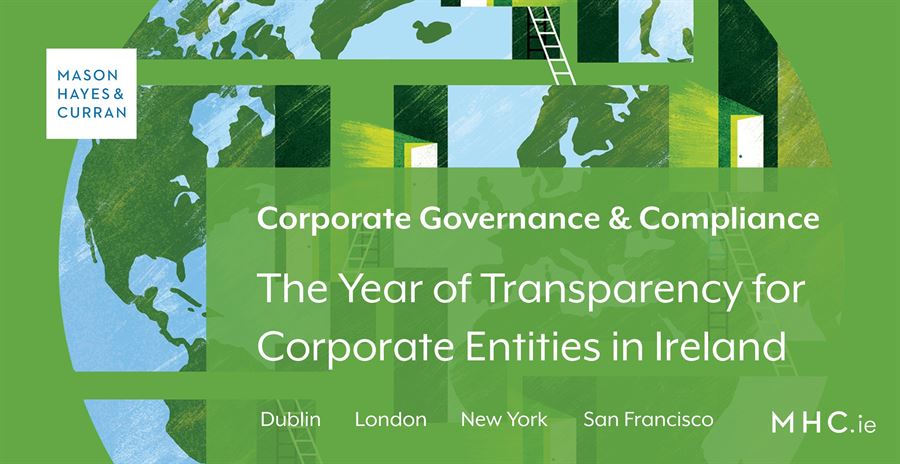
Central Register of Beneficial Ownership of Companies and Industrial & Provident Societies
The European Union (Anti-Money Laundering: Beneficial Ownership of Corporate Entities) Regulations 2019 (the New Regulations), which came into force in March 2019, established a Central Register of Beneficial Ownership of Companies and Industrial and Provident Societies (the Central Register). We discuss the New Regulations in greater detail here.
With one very narrow exception, all corporate and legal entities incorporated in Ireland, defined in the New Regulations as ‘relevant entities', are now required to submit information on their beneficial owners onto the Central Register. Relevant entities incorporated on or before 22 June 2019 were required to do so on or before 22 November 2019, and relevant entities incorporated since that date must file within 5 months of their incorporation.
Access to information on the Central Register is available to individuals acting on behalf of the Irish police force, An Garda Síochána; the Financial Intelligence Unit (FIU); the Criminal Assets Bureau; and the Revenue Commissioners. Together, these are referred to as ‘competent authorities’.
In addition, members of the public and credit institutions, banks, accountants and solicitors who are required to carry out due diligence on customers or clients, or ‘designated persons’, have a restricted right of access to information on the Central Register.
The establishment of the Central Register is in line with the recommendation of the FATF that adequate, accurate and timely information on the beneficial ownership and control of legal persons can be obtained or accessed in a timely fashion by competent authorities. Whether or not the Central Register will be effective in ensuring that legal persons are not misused for money laundering or terrorist financing, will be the subject of further debate and analysis.
Central Register of Beneficial Ownership of Trusts
![]() The European Union (Anti-Money Laundering: Beneficial Ownership of Trusts) Regulations 2019 (the Trusts Regulations), which came into force in January 2019, transpose into Irish law the requirements under the Fourth Anti-Money Laundering Directive (as amended), also known as 4AMLD. These requirements govern the creation and holding of beneficial ownership registers for trusts, also referred to as ‘internal registers’.
The European Union (Anti-Money Laundering: Beneficial Ownership of Trusts) Regulations 2019 (the Trusts Regulations), which came into force in January 2019, transpose into Irish law the requirements under the Fourth Anti-Money Laundering Directive (as amended), also known as 4AMLD. These requirements govern the creation and holding of beneficial ownership registers for trusts, also referred to as ‘internal registers’.
The Trusts Regulations apply to express trusts whose trustees are resident in Ireland or which are otherwise administered in Ireland. We outline some of the various types of trusts that fall within the ambit of the 2019 Regulations and explain who is considered to be a beneficial owner under the Trusts Regulations here.
Trustees are obliged to take all reasonable steps to obtain and hold adequate, accurate and current information in respect of their trust’s beneficial owners.
In addition to obtaining and holding the above information on an internal register, trustees are obliged, on request, to provide the Revenue Commissioners and any other “State competent authority”, ie the Central Bank, the Financial Services Authority, etc., with timely access to their internal register.
The Trusts Regulations permit State competent authorities to disclose the information on an internal register to any corresponding competent authority of another requesting Member State.
Further Irish legislation relating to the beneficial ownership register of trusts is still required, as under 4AMLD, the State will also have to establish a central register for keeping the beneficial ownership information of trusts. The deadline set by the EU for setting up a central register is 10 March 2020.
Companies (Amendment) Act 2019
The Companies (Amendment) Act 2019 (the Act) was signed into law in April 2019, although it has not yet commenced. The Act amends section 343 of the Companies Act 2014 and increases filing periods for annual returns from 28 days to 56.
The Act is designed to fix an anomaly created by section 3.1(a) of the Companies (Statutory) Audits Act 2018. It is anticipated that the Act will be commenced at the same time as Section 3, and that as a result a company will have 56 days from its ARD to both e-file its annual return and submit the financial statements. This will mean that there will no longer be a need to make two separate filings for:
-
The annual return electronically within 28 days of the ARD
-
Lodging the original signed annual return at the CRO within 28 days of the date of e-filing
We will provide updates as and when the legislation comes into force.
Conclusion
2019 was a year of transparency not only for corporate and legal entities in Ireland, but also for trusts. Information on the beneficial owners of Irish companies is now accessible to the public.
Coming in 2020? Corporate Enforcement Authority
Ireland will soon have a new independent Corporate Enforcement Agency (CEA) which will be responsible for combatting white-collar crime. This is the main objective of the General Scheme of the Companies (Corporate Enforcement Authority) Bill 2018 (the General Scheme). We discuss this CEA in further detail here.
The General Scheme will also deal with a few anomalies which have been identified in the Companies Act 2014.
Looking forward to 2020, relevant entities should ensure that any changes in their beneficial ownership are notified to the RBO and trustees should be aware of their obligations to ascertain who their beneficial owners are in anticipation of the expected establishment of a central register early next year.
The content of this article is provided for information purposes only and does not constitute legal or other advice.




